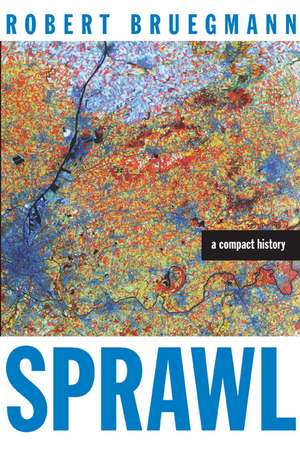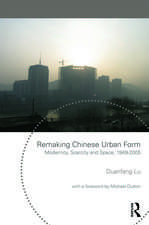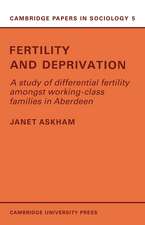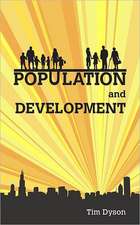Sprawl: A Compact History
Autor Robert Bruegmannen Limba Engleză Hardback – noi 2005
As anyone who has flown into Los Angeles at dusk or Houston at midday knows, urban areas today defy traditional notions of what a city is. Our old definitions of urban, suburban, and rural fail to capture the complexity of these vast regions with their superhighways, subdivisions, industrial areas, office parks, and resort areas pushing far out into the countryside. Detractors call it sprawl and assert that it is economically inefficient, socially inequitable, environmentally irresponsible, and aesthetically ugly. Robert Bruegmann calls it a logical consequence of economic growth and the democratization of society, with benefits that urban planners have failed to recognize.
In his incisive history of the expanded city, Bruegmann overturns every assumption we have about sprawl. Taking a long view of urban development, he demonstrates that sprawl is neither recent nor particularly American but as old as cities themselves, just as characteristic of ancient Rome and eighteenth-century Paris as it is of Atlanta or Los Angeles. Nor is sprawl the disaster claimed by many contemporary observers. Although sprawl, like any settlement pattern, has undoubtedly produced problems that must be addressed, it has also provided millions of people with the kinds of mobility, privacy, and choice that were once the exclusive prerogatives of the rich and powerful.
The first major book to strip urban sprawl of its pejorative connotations, Sprawl offers a completely new vision of the city and its growth. Bruegmann leads readers to the powerful conclusion that "in its immense complexity and constant change, the city-whether dense and concentrated at its core, looser and more sprawling in suburbia, or in the vast tracts of exurban penumbra that extend dozens, even hundreds, of miles-is the grandest and most marvelous work of mankind."
In his incisive history of the expanded city, Bruegmann overturns every assumption we have about sprawl. Taking a long view of urban development, he demonstrates that sprawl is neither recent nor particularly American but as old as cities themselves, just as characteristic of ancient Rome and eighteenth-century Paris as it is of Atlanta or Los Angeles. Nor is sprawl the disaster claimed by many contemporary observers. Although sprawl, like any settlement pattern, has undoubtedly produced problems that must be addressed, it has also provided millions of people with the kinds of mobility, privacy, and choice that were once the exclusive prerogatives of the rich and powerful.
The first major book to strip urban sprawl of its pejorative connotations, Sprawl offers a completely new vision of the city and its growth. Bruegmann leads readers to the powerful conclusion that "in its immense complexity and constant change, the city-whether dense and concentrated at its core, looser and more sprawling in suburbia, or in the vast tracts of exurban penumbra that extend dozens, even hundreds, of miles-is the grandest and most marvelous work of mankind."
“Largely missing from this debate [over sprawl] has been a sound and reasoned history of this pattern of living. With Robert Bruegmann’s Sprawl: A Compact History, we now have one. What a pleasure it is: well-written, accessible and eager to challenge the current cant about sprawl.”—Joel Kotkin, The Wall Street Journal
“There are scores of books offering ‘solutions’ to sprawl. Their authors would do well to read this book.”—Witold Rybczynski, Slate
“There are scores of books offering ‘solutions’ to sprawl. Their authors would do well to read this book.”—Witold Rybczynski, Slate
Preț: 359.07 lei
Nou
Puncte Express: 539
Preț estimativ în valută:
68.71€ • 73.47$ • 57.29£
68.71€ • 73.47$ • 57.29£
Carte tipărită la comandă
Livrare economică 18 aprilie-02 mai
Preluare comenzi: 021 569.72.76
Specificații
ISBN-13: 9780226076904
ISBN-10: 0226076903
Pagini: 306
Ilustrații: 22 halftones, 3 line drawings, 5 maps, 1 table
Dimensiuni: 152 x 229 x 23 mm
Greutate: 0.51 kg
Ediția:First Edition
Editura: University of Chicago Press
Colecția University of Chicago Press
ISBN-10: 0226076903
Pagini: 306
Ilustrații: 22 halftones, 3 line drawings, 5 maps, 1 table
Dimensiuni: 152 x 229 x 23 mm
Greutate: 0.51 kg
Ediția:First Edition
Editura: University of Chicago Press
Colecția University of Chicago Press
Notă biografică
Robert Bruegmann is chair of and professor in the Department of Art History at the University of Illinois at Chicago as well as professor in the School of Architecture and the Program in Urban Planning. His many books include The Architects and the City: Holabird & Roche of Chicago, 1880-1918, also published by the University of Chicago Press.
Cuprins
Introduction
PART 1 - Sprawl Across the Centuries
1. Defining Sprawl
2. Early Sprawl
3. Sprawl in the Interwar Boom Years
4. Sprawl in the Postwar Boom Years
5. Sprawl since the 1970s
6. The Causes of Sprawl
PART 2 - The Diagnosis: Three Campaigns Against Sprawl
7. Early Anti-sprawl Arguments
8. The First Anti-sprawl Campaign: Britain in the Interwar Years
9. The Second Anti-sprawl Campaign: The United States in the Postwar Years
10. The Third Anti-sprawl Campaign: Since the 1970s
PART 3 - The Prescription: Remedies for Sprawl
11. Early Remedies: From Anti-blight to Anti-sprawl
12. Postwar Anti-sprawl Remedies
13. Anti-sprawl Remedies since the 1970s
Some Conclusions
Acknowledgments
Notes
Bibliographic Essay
Index
PART 1 - Sprawl Across the Centuries
1. Defining Sprawl
2. Early Sprawl
3. Sprawl in the Interwar Boom Years
4. Sprawl in the Postwar Boom Years
5. Sprawl since the 1970s
6. The Causes of Sprawl
PART 2 - The Diagnosis: Three Campaigns Against Sprawl
7. Early Anti-sprawl Arguments
8. The First Anti-sprawl Campaign: Britain in the Interwar Years
9. The Second Anti-sprawl Campaign: The United States in the Postwar Years
10. The Third Anti-sprawl Campaign: Since the 1970s
PART 3 - The Prescription: Remedies for Sprawl
11. Early Remedies: From Anti-blight to Anti-sprawl
12. Postwar Anti-sprawl Remedies
13. Anti-sprawl Remedies since the 1970s
Some Conclusions
Acknowledgments
Notes
Bibliographic Essay
Index
Recenzii
"After 70 years of suffering the slings and arrows of academic criticism, suburban life finally finds a compelling defender in Bruegmann. A professor of art history and urban planning at the University of Illinois–Chicago, Bruegmann demonstrates that urban sprawl is a natural process as old as the world's oldest cities, wherein large metropolises reach a point of maturity and those with financial means escape the congestion and high prices of city life. What has changed over the past century, the author says, is that an increasing number of citizens have achieved the financial means to participate in what was once an exclusive luxury of the wealthy. Bruegmann acknowledges that the effects on cities are not always positive, but he also demonstrates that many of the criticisms of suburban sprawl—e.g., that it is culturally deficient and environmentally noxious—are greatly exaggerated and ignore the very real benefits sprawl offers in terms of privacy, mobility and choice. With his disdain for doomsday predictions and his disregard for the academic consensus, Bruegmann's thorough analysis is sure to be controversial, but a shot of controversy ought to do the field, and public dialogue about it, some good."--Publishers Weekly
"Almost compulsively contrarian."
"There are scores of books offering 'solutions' to sprawl. Their authors would do well to read this book. To find solutions--or, rather, better ways to manage sprawl, which is not the same thing--it helps to get the problem right."--Witold Rybczynski, Slate
"Urban elites and the left have for decades savaged the suburb, arguing that the suburb is environmentally unsustainable, an aesthetic blight on the landscape, homogeneously white bread and morally defective. A backlash is now well underway, with a slew of pro-suburb writers and policy wonks . . . attacking these politically correct views and defending the homes of what has become the majority of Americans. The latest defence--an engaging and non-ideological book entitled Sprawl . . . promises to become the most influential of the lot."--Lawrence Solomon, National Post
"Largely missing from this debate [over sprawl] has been a sound and reasoned history of this pattern of living. With Robert Bruegmann's Sprawl: A Compact History, we now have one. What a pleasure it is: well-written, accessible and eager to challenge the current cant about sprawl."
"Controversial and gleefully contrarian."
"Sure to become a flash point in the debate over sprawl and is therefore well worth reading--even if the book tempts you to toss it out the window."
“[Sprawl] is a good and timely book, and I recommend it to anyone interested in cities or general patterns of human settlement. The book is meticulously researched, ambitious in scope, well reasoned, and enjoyable to read. It offers a carefully balanced, non-polemical overview of a subject much polemicized in recent times.”—Alex Krieger, Commonwealth
“To judge whether sprawl is a symptom of global capitalism at its most rampant and wasteful . . . technical arguments must be addressed. Bruegmann takes us through them lucidly and economically, neither flinching from nor getting mired in detail, and steering deftly between neo-con smugness and liberal anguish. These qualities make Sprawl a textbook for our times.”
"If you have not read Sprawl: A Compact History, drop everything, obtain a copy and read it. It is the most important book on the American landscape since Jane Jacobs' The Death and Life of Great American Cities. Do not be deceived. Sprawl is as much about cities as it is about suburbs; as much about England, France, Germany, and Russia as it is about the United States; and as much about the early 21st century exurb as it is about 19th century slums or ancient Rome. It succeeds as a deeply illuminating work because of Robert Bruegmann's unique position among urbanists: He combines an insistence on looking at what is actually on the landscape with an encyclopedic knowledge with the literature on cities. The result is a keen observer able to identify striking relationships. . . . . You may think you know this material. Be assured--once you read this book you will be amazed how little you truly understood about the subject."
"This is a book that a geographer should have written. Scholarly, yet accessible to a wide audience, it treats an important subject that is both controversial and inherently spatial. . . . Subtle and well-informed, [Sprawl] mounts a sustained critique of a set of assumptions and arguments that dominate public and academic debate. For anyone with an interest in, or a practical engagement with, urban development issues, Sprawl is indispensable reading."
"By asking tough questions, postulating rational responses, and trying to separate fact from fiction, Sprawl may be the most intelligent critique of antisprawl reform in print. It is unquestionably a book to be read and debated."
"The clarity of writing . . . makes the book a pleasure to read. [Bruegmann] is tough on ecologists, public trnsportation supporters, planners . . . critics of capitalism, and anyone who cannot accept that suburbs are where most people want to live."
















